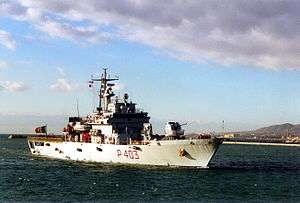Cassiopea-class patrol vessel
The Cassiopea class is a heavy series of four patrol boats of the Italian Navy. They were built in the late 1980s on civilian standards. They are designed for patrol in safe areas.
 Patrol ship Spica (P 403) | |
| Class overview | |
|---|---|
| Name: | Cassiopea |
| Builders: | Fincantieri - Muggiano |
| Operators: |
|
| Completed: | 4 |
| Active: |
|
| General characteristics [1] | |
| Type: | Patrol vessel |
| Displacement: |
|
| Length: | |
| Beam: | 11.80 m (38 ft 9 in) |
| Draught: | 3.60 m (11 ft 10 in) |
| Propulsion: |
|
| Speed: | |
| Range: | 3,300 nmi (6,100 km; 3,800 mi) at 17 knots (31 km/h; 20 mph) |
| Endurance: | 35 days |
| Crew: | 6 officers, 54 enlisted |
| Sensors and processing systems: |
|
| Electronic warfare & decoys: | Elint equipment |
| Armament: |
|
| Aircraft carried: | 1 Agusta-Bell AB-212 ASW helicopter |
| Aviation facilities: | Hangar and flight deck |
Development and design
In the early 1980s the Italian navy developed two classes of corvettes to replace older vessels. The Minerva class were fully combatant ships to serve as coastal escorts, and equipped with modern sensors and armament, while the Cassiopea class were simpler offshore patrol vessels intended to replace the old Albatros-class corvettes used for fisheries patrol.[1][3]

Construction of four ships (out of eight originally planned) was authorized in December 1982, with funding from the Ministry of Merchant Marine. Orders were placed in December 1986, with construction starting the next year at Fincantieri shipyard, Muggiano. The ships were built to mercantile standards, and the first ship entered service in 1989. A further two ships were cancelled in 1991, prior to the start of construction.[1][4]
The ships' main gun armament is a single 76mm/L62 Allargato gun; both gun and fire control systems came from scrapped Bergamini-class frigates. Each ship is fitted with a flight deck and fixed hangar to accommodate a helicopter type Agusta-Bell AB-212 ASW of the Italian navy. Each also carries equipment for dealing with pollution.[1] Between 2012 and 2014 all units were fitted with Selex ES Janus-N IR optronic system. As of 2014 the ships, starting with Libra were fitted with new dual-band navigation (X/Ka) Gemini-DB radar systems from GEM Elettronica.
Ships
Source:[1]
| Name | Pennant number |
Hull number |
Laid down | Launched | Commissioned | Motto | ||||
|---|---|---|---|---|---|---|---|---|---|---|
| Cassiopea | P 401 | 5846 [5] | 16 March 1987 | 19 July 1988 | 21 October 1989 | Adsum | ||||
| Libra | P 402 | 5847 | 16 March 1987 | 27 July 1988 | 23 March 1991 | Patiens vigil audax | ||||
| Spica | P 403 | 5848 | 5 September 1988 | 27 May 1989 | 23 March 1991 | Vigile attendo | ||||
| Vega | P 404 | 5849 | 30 June 1989 | 24 February 1990 | 8 May 1992 | Sempre e ovunque | ||||
Notes
- Baker 1998, pp. 380–381.
- Gardiner and Chumbley 1995, p. 197.
- Grove 1990, p. 95.
- "Archived copy" (PDF). Archived from the original (PDF) on 2016-11-19. Retrieved 2016-11-18.CS1 maint: archived copy as title (link)
References
- Baker, A.D. The Naval Institute Guide to Combat Fleets of the World 1998–1999. Annapolis, Maryland, USA. ISBN 1-55750-111-4.
- Gardiner, Roger and Stephen Chumbley. Conway's All The World's Fighting Ships 1947–1995. Annapolis, Maryland, USA. ISBN 1-55750-132-7.
- Grove, Eric J. NATO Major Warships - Europe. Tri-Service Pocketbook. London: Tri-Service Press, 1990. ISBN 1-85400-006-3.
| Wikimedia Commons has media related to Cassiopea I class patrol boat. |
